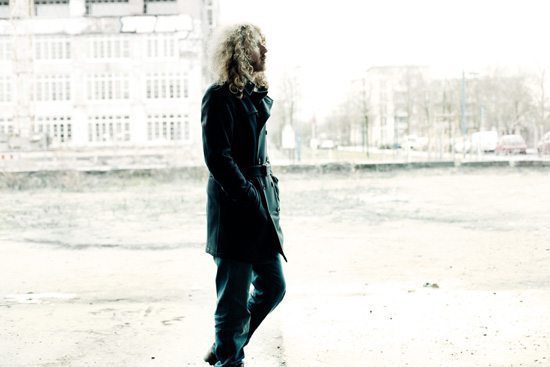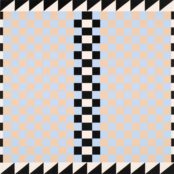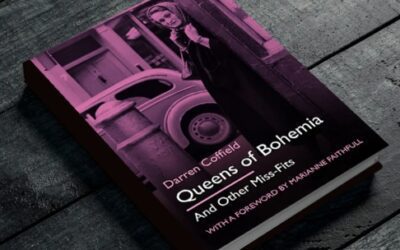"I think everyone should take more risks constantly, not just musicians"
James Leyland Kirby (latterly known as The Caretaker) is a mysterious figure in electronic music. Respected but somewhat distant from the central commercial aspects of much of the scene Kirby has been creating music since the early nineties and was one of the late John Peel’s favourite acts. Never standing still, he’s covered a hell of a lot of ground. So far he has released ambient music under the Caretaker moniker as well as the harshest mash-up music as V/Vm, maintained an uncompromising electronic label, been a noisy cover artist for the usually navel gazing WIRE magazine, and most importantly has steadfastly refused to repeat himself. He has also been widely copied, elements of his work as V/VM and The Caretaker have been used by artists more willing to compromise on depth for accessibility.
Characterised by a sense of decomposition, Kirby’s releases as V/Vm sadistically reworked 80s and 90s hits however it’s his later work as Caretaker that is far more affecting and can be an intensely unsettling experience. Elemental washes of sound build and grind against each other, reverb laden clicks hint at rhythms but are largely propelled by a variety of changes giving a sense of doomed momentum. It’s not easy listening by any means but it is affecting and honest; a rare commodity.

Trebuchet: How did you get started in music?
James Leyland Kirby: I was DJing around Manchester in the early 1990's and at the time it seemed possible to try and make some electronic music of my own. It was a very steep learning curve back then as I had no idea how any of it worked at all, so I kept buying hardware and trying to run it all off an Amiga running music-x which was so bad it was good. I had no idea what I was doing, but two good friends were also using it and we kind of helped each other to make sense of the equipment we had and I guess I haven't stopped since.
Trebuchet: What were the early pieces of kit you used?
James Leyland Kirby: I had a few analogue keyboards, an SH-09, SH-101 and also a Roland JV-1080 which I put to good use, along with a couple of cheap boss drum machines. I worked to buy everything and had low quality mixers and leads but it was good fun, a real education in putting things together as there was no handbook at all. Everything was trial and error with so many errors.
Trebuchet: What made you want to make music in the beginning?
James Leyland Kirby: The initial energy of electronic music coming out of Chicago and Detroit had a massive impact on me, listening to this music fresh for the first time was incredible. The energy in clubs has been unmatched since, I just enjoy energy and wanted to create some of my own and learn how this music had been made. It was the sound of the future back then.
Trebuchet: Can you describe some of the club nights for us? What made them so special?
James Leyland Kirby: It's more about the energy to be honest, the music was so fresh, there was a real enthusiasm from all those people who were DJing. It wasn't about being the best or impressing people. It was about the new sounds and it seemed each week something new was coming along. Tracks which made dance floors explode, many of them even made it into the charts of the day also.
Trebuchet: Have you found other reasons to make music since then?
James Leyland Kirby: Well I have gone through many stages now, from smashing music to pieces to now making more emotional and connected work. I love working and I'm lucky enough to be able to work doing what I love which is experimenting each day should I choose too on whatever intrigues me. I have no idea when this inspiration and drive will stop, but if one day I wake up and feel no excitement then I'm big enough and strong enough to do something else.
Trebuchet: How important is it (or not) to be conscious of what other musicians are doing?
James Leyland Kirby: Well I am very isolated these days for focus; it's not important to me what others are doing. I do listen to a lot of contemporary music though and love so many things. I'm always open to hearing new things, but I've never been one to copy any else whole stock. I like to spin things in a new way and try to work with a child like wonder of things. Half the time I have got no idea what I am doing and sometimes things just click and that is an amazing moment, hearing that melody come out from nowhere and it's really moving you. I love these moments right now.
Trebuchet: What are your current favourite pieces of music?
James Leyland Kirby: I am not particularly someone who is influenced by similar music to that of my own, generally I play a lot of 80s music, big pop hits from the time, extended 12" mixes. Also I have a big love of Belgian New-Beat music from the late 80s early 90s. I also love a lot of incidental music from some classic 70s and 80s T.V. shows. I just go with mood mostly, right now I have a thing for you tube videos made by people with no agenda to look cool or to fit in but only to communicate with an unknown audience.
Trebuchet: In the beginning, was there a moment when a piece of music moved you to think, of music as a forefront activity for you rather than something happening in the background?
James Leyland Kirby: Like I said before it was more about a feeling than anything, that something important was going on. At school in England I had just started doing A-Levels; I remember dropping out two months into that and the teacher telling me "I would regret that for the rest of my life". Looking back what I would have regretted more would to have stayed there learning facts and missing out on this really energetic phase of creation and openness. Location you see played a very important role in what I have done ever since, being around that Manchester scene at the time when really Manchester was the centre of the dance music World for a couple of Summers.
Trebuchet: Do you still have those moments now?
James Leyland Kirby: Well now I’m a little older and probably not wiser, but I have a very strong connection to most of the work I am doing, it can be seen in many ways as a true reflection possibly of who I am. I just try to be truthful every day through working hard and try to take each day as it comes. Things are not the best ever for me right now on many levels, but they are not the worst either. I feel as though I am alive, which is the best thing we can hope for these days. There are many things I need to work on at the moment personally and really I'm as lost as everyone else is right now.
Trebuchet: Speaking of location; does Berlin affect your music? Are there particular places that give you the juice to create? Or is there something in the atmosphere of a city that gives you that creative push?
James Leyland Kirby: You know Berlin is pretty shit for creativity, so many people come here and think it's such an amazing place as there is always a party, always a new bar, some free drinks, tons of girls and chaos on every corner. The key though is that most of them get lost in Berlin, they go out and never come home. They never do any work, for some of them that is cool, as most people here seem either to be funded by their countries to be here or have rich parents. I don't have either luxury but I seek out a lot of chaos as that fuels my own creativity but in-between that I disappear into my own little cave here and work hard. I walk around here most days and meet up with a good friend to take coffee and it's disappointing how it's turning out here. It's unrecognisable really these days as people are here for some kind of coolness in their lives instead of being here because there is no other option. I moved here because I had no option, Britain is fucked and too expensive but I like being in a big City, no other big City was as cheap as Berlin but that's changed now big time. Once money moves in any kind of creative vibe is lost.
Trebuchet: It seems to me that people are feeling a culturally directionless at the moment and certainly disenfranchised politically, is it the same for you?
James Leyland Kirby: I think collectively we are all lost, we have had to take in so much change in too little time over the past twenty years. Also for some reason we've been kidded into telling everyone about everything we are doing too to make ourselves feel more important on a day to day basis. I think this comes from a change in perspective, when I was a child it was always sold to me that we can be anything we want to be. As we grow we realise that our social standings and a million other factors actually don't allow this. A few people can buck that trend though, for me since I was young I always wanted to work with sound, now I do it and as I have never learnt music and had little encouragement from anywhere it's a triumph of will and enthusiasm over surroundings.
Trebuchet: What makes you angry?
James Leyland Kirby: People who just coast along and take no risks in arts and music. This kills me constantly, you see them, funded usually by their parents or arts boards and they are just endlessly taking the piss out of them and the people buying music whilst not having one decent bone in their bodies. Where are the real creatives? They are buried beneath a pile of creative diarrhoea gasping for air and trying to survive any way they can.
Trebuchet: How would you describe good music?
James Leyland Kirby: Well nobody knows the answer to this one, but it's all about a feeling and timing. As long as you feel something and it resonates in a way then personally to you it can be a very beautiful thing. Music and memory is intrinsically linked.
Trebuchet: Do find it difficult to listen to your old recordings? In a way do you think of your older stuff as a document of previous lives?
James Leyland Kirby: The thing is time changes many things, at the end of the day all I have done is work hard from day one to now. I always hope that some things gain some relevance and power along the way as what I have done in terms of attitude and output has not changed now since 1996.
I am still independent and somehow survive each day without having to compromise or suck up to any people. Attitude however from the outside can change to how work is seen. I mean most people dismissed a lot of V/Vm work as pranks, take for example an album like "Sick Love" that was about recontextualisation and memory just as much as any Caretaker album was. Now people are drawing lines and seeing that I've been working along the same lines for many years now, even though those lines are zigzagged and crazy and sometimes make no sense. That's great for a whole body of work to make no sense these days as everything is so calculated out there.
Trebuchet: Being a different person with time can you revisit earlier pieces of music as a new listener? What do you think of that music?
James Leyland Kirby: I can look back with a certain sense of pride in a lot of the work I have released. I have been working and re-working out what to put in a retrospective box set release which has been planned since 2007 now. Occasionally I listen to a lot of the older stuff and unreleased stuff and sometimes newer works make more sense now.
Trebuchet: The music released under The Caretaker moniker has been said to recall brain functions, in what way do you consider this akin to portraiture?
James Leyland Kirby: Well again, this project is based around picking fragments. It's like sitting in a chair and wandering down memory lane, the way the Brain works is still one of the biggest mysteries. If you take say a typical Alzheimer’s patient, when that disease is very advanced one of the last things you remember are melodies and song, I use that as an inspiration really.
Trebuchet: Do you see music as an expression of memory then? Can you describe a particular memory you’ve used in one of your tracks?
James Leyland Kirby: No I think we attach many memories to music, so in terms of that Caretaker work its like picking away at a brain which is disintegrating and stuck with the same memories playing out over and over.
Trebuchet: What do you look for in a musical subject?
James Leyland Kirby: I look for possibilities and movement, I need to go forward always and try not to repeat things in the totally same way each time. I mean if people have followed me from 1996 (and I know some have) then for them it's not been an easy journey. For me too it's been a hard road I have taken, I turned my back on Electronic music to hack other music to pieces, and then I scrap doing that to make more composed works now. Also I have burnt so many bridges that now I will only ever exist on the outside of all scenes which is why I rarely play live as nobody wants me too. Really with the work I am free to do as I please and I trust in people to appreciate that and support me if they can and feel moved enough to do that.
Trebuchet: Burnt bridges?
James Leyland Kirby: Yeah and I still love burning them if I don't like something. I had it the other month with a show I was supposed to play in Berlin, it would have been good for me to play there, you know for the contacts and so I look professional, but the guy organising it was a complete Ostrich so I told him so and didn't play. Even though my parents were flying over from England it seemed better to not perform for such an idiot. Now I'm sure this idiot (and in fact, I know) he's well connected, so I'm sure there's a knock on effect here in action, but I can't worry about that. All I can worry about is my work and that I do the best I can. I will upset people as I don't want to network or sell my soul for some sales here and there, it goes with that territory and I wish more people would be like this. It's full of fucking two faced sycophants out there; the music scene is a total disgrace mostly.
Trebuchet: So you don’t consider how people will react to your work?
James Leyland Kirby: I don't think we can consider this too much otherwise we get affected and then instead of being a so called artist we become a designer with a brief for the audience who then becomes the client. I think too many people worry about audience these days and it stops them from risk taking. I love to take risks, in life, in love and in bars I am taking risks everyday and opening up more possibilities for chaos.
Trebuchet: Risks are good. What risks should musicians take more of?
James Leyland Kirby: You know, I think everyone should take more risks constantly, not just musicians. I think we have lost the ability to go with our hearts and really we over think everything in the heads these days.
Musicians should just be honest, as someone who got into this whole charade by buying other people's music I always looked for people who had their own style, who took risks and went out on a limb with their creations. It's easier to just copy and fit in, but it's harder to innovate, change and grow and to challenge an audience. Not many people have followed my own path from start to finish, but a few have and I know who they are. It's been more interesting I feel than some bigger names that have been going through the motions for years now just to keep hold of their audiences. It's more of an adventure, I mean I have no idea what is going to happen tomorrow or next week, there's no real plan here afoot. I'm just working on doing what I enjoy and of course risk taking along the way wherever I can.
Trebuchet: To what extent is emotion a component of your work?
James Leyland Kirby: These days it's a massive component, in the past less so. Maybe it's just where I find myself now, we always should be changing. There is nothing worse than someone who just stays the same year after year and goes through the motions. It's a duty really we all should have to grow and develop, even if we make mistakes we have to enjoy those as much as a success. Often there seems no reason to doing anything these days and collectively we are all a little lost as we realise the vastness of everything and nothing.
Trebuchet: Much of your work is strongly composed, what interests you about rigid composition opposed to ‘accidental’ works? Do you think there is a distinction?
James Leyland Kirby: New works are more composed but there are many mistakes in there and I'm sure if you played some of my tracks to music professors they would scratch their heads because they are surrounded by rules, red tape and their past.
Everything I am doing is a big accident really. You know I had a good friend over here last month, I was reminding him of the last time I saw him around 3 years ago. On that night it was the record birthday which falls on a February 29th. That night I told him I wouldn't be involved in music the next time this date came around (which is next year now) because right at that point I felt nobody was really interested in what I was doing at all and although I wasn't demotivated I just felt it and myself was just pointless. Now I’m more optimistic again because I’ve worked hard to survive another three years and people seem interested in some of what I'm trying to do without me forcing people to be. I think it's a great compliment these days if people like what we are doing, it's very humbling really.
Trebuchet: Do you consider symmetry when making a piece of music?
James Leyland Kirby: I can't say it's something I have ever thought of.
Trebuchet: What role does instinct play in the choices you make as a musician?
James Leyland Kirby: Instinct not only in music but in life, I live by it and if we follow it although it can often be harder sometimes it's also a fantastic guide. We are in our heads too much a lot of the time, so sometimes it's best to go with a feeling and run with that. Even if that feeling is one of heartbreak sometimes we have to break the heart again to feel totally free.
Trebuchet: Your work seems quite dark compared with some of your contemporaries and yet people have mentioned a sense of humour in how you approach music. Have you considered lighter material or is that choice not part of the process?
James Leyland Kirby: I have no idea why it's like this, I have a lot of unreleased stuff here and there are some lighter tracks in there, the problem I find at the moment is that when I dive into some of this work it's not always good for me emotionally. It can be hard to make such things, "sadly, the future is no longer what it was" was very difficult to work on in places. Very draining on me to be honest which is a great thing to say and feel in many ways. I love the beauty in sad moments too, you know we have to ride the lows the same as the highs and as long as we both lows and highs we live more instead of being passive.
Trebuchet: What’s next for Leyland Kirby and V/VM?
James Leyland Kirby: Well you know I think I’m going to take a walk in the Sunshine and rely on something good happening right now, because I need that something good at the moment.

Editor, founder, fan.


















